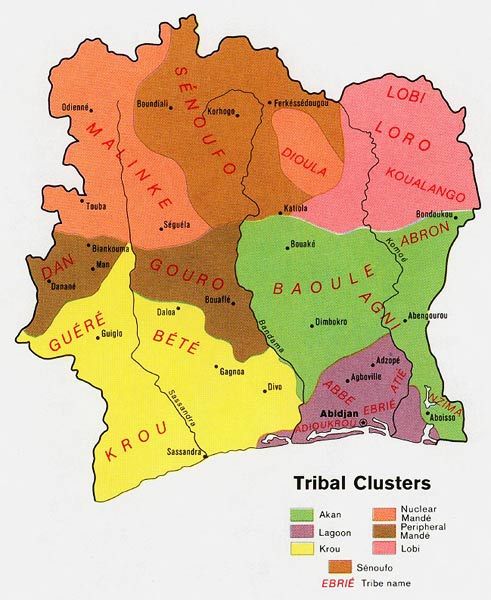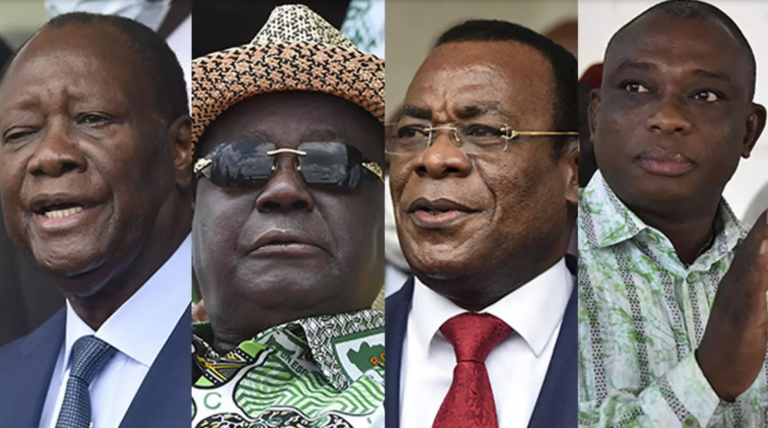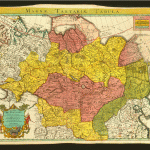With the presidential election in Côte d’Ivoire days away, a revived acrimony between President Alassane Ouattara and his rival candidates is raising concerns of a return to the 2010-2011 postelection crisis. After the 2002-2007 civil war, the 2010 disputed election led to a brief, but deadly return to conflict that killed over 3,000 people. The memory of this traumatic period is still fresh and recent episodes of intercommunal violence in opposition strongholds have caused alarm.
Possible developments, having the least potential for conflict, suggest that both incumbent President Ouattara and his historic rival Henry Konan Bédié would have been excluded from contesting as a result of a constitutional amendment reinstating age limit for presidential candidates.

Another significant pre-election plot twist is the Constitutional Council’s decision to exclude popular former President Laurent Gbagbo (2000-2011) – the main challenger of the 2010 election results – and former rebel leader Guillaume Soro from the race, because of their local criminal convictions. The council whittled down the initial list of 44 presidential candidates to only four – President Ouattara, at the helm of the Rassemblement des Houphouëtistes pour la Démocratie et la Paix (RHDP); Parti Démocratique de la Côte d’Ivoire’s (PDCI) leader, Bédié; Pascal Affi N’Guessan, the head of the splinter faction of the Front Populaire Ivorien (FPI – Gbagbo’s historic party); and ex-PDCI, turned independent candidate, Kouadio Konan Bertin.
After the council’s contested ruling, opposition candidates Bédié and N’Guessan initially called for “civil disobedience” in mid-September, before upgrading their demands to an “active boycott” of the election. On 15 October – the first day of campaigning – both candidates asked their supporters to withdraw their participation from any activity associated with the 31 October polls and “to prevent any operation linked to the ballot being held”.
There are two scenarios for Côte d’Ivoire elections aftermath.
Scenario 1: President Ouattara secures landslide victory in the first round.
This most likely scenario would see President Ouattara securing an absolute majority on 31 October, reaching the fifty percent plus one vote threshold required to win the race in the first round. Assuming that the opposition maintains its boycott call, and that the first round is held within the current electoral framework (see Scenario 2) – with an Independent Electoral Commission (CEI) and Constitutional Council alleged to lean in favour of the ruling coalition – Ouattara has a strong chance of securing a landslide victory (over 55-60 percent) in the first round. While neither Bédié nor N’Guessan have officially withdrawn their presidential candidacy as part of their call to boycott the electoral process, in practice, Ouattara’s only contender is Bertin – who has little to no prospect of securing more than 10 percent of total votes. Best known as KKB, the independent candidate previously was the non-elected MP of Bédié’s PDCI party for Port-Bouët (2011-2016). Prior to the Constitutional Council’s confirmation of his candidacy, he was little known to the majority of the Ivorian electorate. Widely perceived to be a “puppet” of the ruling coalition, his disregard of the opposition’s boycott call has further fuelled these speculations and damaged his credibility in the eyes of voters. One of our opposition-affiliated sources described him as “a candidate whose nomination was approved only to legitimise Ouattara’s illegitimate election”. As the incumbent, Ouattara is likely to comfortably secure a decisive win. Since coming into office, he has presided over an annual economic growth rate of over 7 percent, partly thanks to his government’s ambitious public investment programmes and business-friendly policies that have boosted foreign investment. While the benefits of this record growth have not always trickled down, an Ivorian middle class has (re-)emerged, on which the RHDP is counting to deliver victory, beyond Ouattara’s historic voters’ base in the north. The incumbent is leveraging his strong macroeconomic track record and positioning himself as the guarantor of peace and stability to obtain a decisive first-round win.
Under this scenario, there are three key drivers of change that could disrupt the ruling coalition’s plan.
1. Voter turnout The opposition’s real strategy is to play on voter turnout to discredit the winner of the presidential election – that is Ouattara – who will lose all his legitimacy and credibility, both regionally and internationally. Voter turnout will either delegitimise the electoral process or add credence to Ouattara’s first-round victory. The 2010 and 2015 presidential election turnout, 83 percent and 52 percent respectively, was high.
If voter turnout at the upcoming polls is under 40 percent due to COVID-19 concerns and/or the effectiveness of the opposition’s call to boycott the polls, the results are expected to be widely discredited. This will make it challenging for the CEI to confirm Ouattara’s victory without entirely losing credibility at home and abroad.
2. Security services use deadly force against unarmed protesters. The use of disproportionate force and the intentional or unintentional killing of unarmed opposition demonstrators prior to, or on polling day has the potential to trigger widespread unrest and violence. This could in turn lead to the forced postponement of polls or the invalidation of election results.
3. The severity of disruptive tactics on polling day. While polls are currently set to take place on 31 October, if opposition disruptions reach a critical level – to the extent of widely preventing voters from casting their ballots – the election results may be delegitimised, if not entirely invalidated. The opposition’s planned disruptive tactics on election day may include blocking polling stations from opening, destroying or seizing of electoral equipment, and erecting roadblocks to prevent internal travel. These tactics reflect the enigmatic forewarning issued by former rebel leader Soro in mid-September – “there will be no election” – which has caused alarm within the ruling coalition. While these three drivers of change have the potential to upend this first scenario, under the present circumstances, Ouattara is set to secure a decisive win on 31 October.
Scenario 2: The opposition withdraws the election boycott at the last minute; the ruling coalition agrees to a short postponement of polls to allow for the restructuring of the electoral commission (unlikely) The second, but relatively unlikely, scenario would see Bédié and N’Guessan calling off the election boycott on the eve of the first round in exchange for the restructuring of the CEI and, potentially, the brief postponement of the presidential election. This scenario is largely contingent on the outcome of ongoing negotiations between the RHDP and the opposition. Last week, with 10 days to go before polls, the Minister of Territorial Administration and Decentralisation, Sidiki Diakité, whose portfolio includes oversight over the electoral commission, announced that the ruling coalition had decided to consider requests from the opposition to restructure the electoral commission. Reforms would include granting the CEI central commission’s vice presidency to Bédié’s PDCI as well as restructuring the local branches of the electoral commission – seen as being most biased in favour of the RHDP. In an additional gesture of appeasement, the RHDP expressed its openness to a bilateral meeting between President Ouattara and Bédié, aimed at re-integrating the opposition into the electoral process. Should this last minute round of negotiations be fruitful, the opposition may agree to withdraw the boycott on the eve of the first round, in exchange for sweeping reforms to the CEI and, potentially, the postponement of the first round of polls by 1-3 months. This scenario, however, is unlikely because Ouattara’s strategy is to “get the election over with as quickly as possible” – winning in the first round, quickly forming a government and, only once that is done, making concessions to the opposition ahead of the 2021 legislative elections. The opposition also is unlikely to agree to withdraw the boycott by 31 October. Even if Bédié were tempted to agree, he is fully cognisant that if he did, he would not receive the much-needed backing of other opposition parties to win in the second round.
While Ouattara could agree to postpone the election to allow for the restructuring of the CEI and de-escalate tensions, the president has shown no inclination to withdraw his third-term candidacy. Ouattara has strong chances of winning a comfortable majority – with or without the opposition’s electoral participation. He enjoys the tacit backing of key regional and international players (see below), has no incentives to withdraw from the race and his coalition lacks a strong alternative candidate. Commenting on the rumours surrounding Ouattara’s alleged negotiations for his immunity, an FPI-affiliated academic at the Félix Houphouët-Boigny University noted that “the immunity card certainly wouldn’t stop him [for running in the election]. Just look at what happened to other side-lined African presidents such as [José Eduardo] dos Santos.” Implications for national stability and security Under scenario two, if the opposition were to call off the boycott, the risk of violence would be significantly reduced. The restructuring of the CEI would contribute to defusing tensions and curb claims of the invalidity of the polls. With less than three days to go to polling day, however, the likelihood of this scenario is minimal. As one of our Abidjan-based diplomatic sources warned, “The question is, when Ouattara will win – and I say when because he will win a decisive majority, unopposed in the first round – what will happen to the country?”. Under the first, most likely, scenario, we expect a spike in anti-government protests when the CEI announces Ouattara’s victory, most likely towards the end of the first week of November. We expect localised violent clashes between anti-Ouattara demonstrators and security forces, similarly to the ones witnessed in Guinea after the election commission announced President Alpha Condé’s landslide third-term victory. Besides Côte d’Ivoire’s economic capital Abidjan, and notably its working-class district Yopougon, we expect political clashes and violent incidents to be concentrated in opposition strongholds, including in Gagnoa (Laurent Gbagbo’s hometown), Bongouanou (N’Guessan’s stronghold), Daoukro (Bédié’s hometown), and Dabou and Bonoua – two towns in the outskirts of Abidjan that have witnessed widespread violence since Ouattara’s third-term bid announcement. Protests are also expected to cause significant supply chain disruptions as a result of roadblocks and barricades. The concern locally and among international political observers and investors is that, under the worst-case scenario, clashes could evolve into widespread intercommunal violence between proand anti-Ouattara ethnic groupings. In the opposition stronghold of Dabou last week, seven people died and 40 were wounded as a result of intercommunal clashes between Adioukrous, perceived to be favourable to the opposition, and Dioulas, northerners seen as being supportive of the Ouattara-led government. Similarly, the day before, in Bongouanou, violent clashes between Agnis demonstrators and Dioulas resulted in at least two deaths. Despite some signs of an escalation of ethnic-based violence, a return to an all-out post-electoral civil war engulfing the whole country remains improbable under this scenario. While most of the same political players from the 2010-2011 electoral crisis are competing for power, the circumstances have changed.
As well as protests and strikes, many expect the violence will take on an ethnic dimension – pitting northern communities who normally vote for Ouattara against southern, eastern, and western groups associated with the opposition.
Clashes of this kind have already been reported in August in the central town of Daoukro, a stronghold of Bédié, and more recently in Bongouanou, an N’Guessan base, and in Dabou, 50 kilometres west of Abidjan.
Since 2020, the focus seems to have been on ensuring the survival of the old political guard rather than ensuring sustainable peace. The revised 2016 constitution, which was amended in 2019, was quick to determine a minimum age of 35 for any presidential candidate – but deliberately removed the upper age limit. With the balance of power on its side, the government doesn’t seem willing to make any significant concessions to the opposition on contentious issues.
The police and military face many problems ranging from lack of accountability to politicisation. The security forces have also unleashed the repressive state machinery on protesters in the build-up to the election.
The candidate who wins elections will face a presidency lacking in legitimacy. His victory could be contested, leading to ongoing political instability for Côte d’Ivoire. This would affect stability in a region still grappling with controversial election results in Guinea that add to existing security problems.
Côte d’Ivoire has missed another opportunity to hold elections that break from past experiences which undermined peace and democracy.




